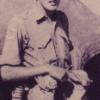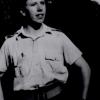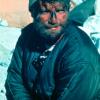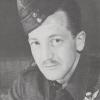We waded out into the phosphorescent waters of Dunkirk where I and most of my half battery were picked up by a flotilla of launches which ferried us out to a Thames tug. We had been defeated, but they gave us a hero's welcome in Ramsgate. In due course, we reformed at Aberystwyth but since we had no weapons, there was little to do except march up and down the sea front. The only real compensation during this period was the arrival of the Chelsea School of Physical Training for Young Women which had been evacuated to Aberystwyth. These beautiful, healthy girls really kept us on our toes. But some of us were getting very fed up with being inactive and we started applying to join any unit that looked as if it might have some weapons, and might get us back into the fight again.
I volunteered for No. 2 (Parachute) Commando, and joined it in October 1940. After completing my initial five parachute jumps at Ringway and Tatton Park and getting my wings, I was sent up to Scotland and Northern Ireland to recruit officers and other ranks for my troop. On the day I got back, in December, they changed the name to 11th Special Air Service Battalion (Parachute Wing). This made little difference to us, and we proceeded with our training, such as it was.
Training was largely based on night attack exercises, weapon training and unarmed combat — sticking knives into the backs of sentries, that sort of thing. We found it exciting, but it probably wasn't very realistic; our commanding officer, Colonel Jackson, was a Tank Corps man. There were very few of us with any experience of commando or special force fighting, and we really weren't sure what we were supposed to be doing. We enjoyed the training, except that nobody was terribly keen on marching. So the fact that you couldn't march far in our specially designed `shock-absorbing' rubber-soled boots suited us well. I suppose we imagined that marching wouldn't come into our operations — we'd just drop behind the lines and, duty done, we'd be spirited out by some unknown means. We were disabused of these fantasies later.
In those early days nobody knew anything much about parachuting or the use of parachute troops — we had to learn as we went along. Initially the prospect of the parachute jump inspired a certain degree of awe and I suppose fear; the novelty value made it seem more important than it was. If anything went wrong, it could affect morale. So we had to try and find a way of making parachuting seem of less significance. A few of us stirred up a competitive spirit by clocking up as many jumps as we could; one night I did a balloon jump in my mess kit, complete with spurs — I was going to a mess night dinner and had to fit this balloon jump in. It wasn't bravado, but it raised a laugh and perhaps helped make parachuting seem a bit less intimidating.
Morale was pretty unpredictable, though; one week, when Brigadier Gale was in command, there were three or four 'Roman candles' (parachutes which failed to open). The Brigadier decided that to 'restore morale' he would parade the whole brigade in Tatton Park. So he marched us all out there on a Saturday afternoon. As you can imagine, a parade on a Saturday afternoon wasn't exactly conducive to raising morale. When we got there, he sat us down in a huge semi-circle, while he explained that the accidents had been almost entirely due to faults which he personally would put right. But he believed our jumping techniques left a lot to be desired, and to show us how, he'd arranged for seven planeloads of instructors (in Whitleys) to fly over and demonstrate how easy jumping was if you followed the correct drill.
Well, to start off with there was a hell of a delay with the usual singing of 'Why are we waiting?' which cheered everyone except the top brass. Eventually, instead of seven Whitleys, just two of the old dears lollopped overhead and we watched expectantly as the dropping started. Now I've seen some bad dropping in my time but this was absolutely catastrophic —people coming out upside down, legs apart, somersaulting and swinging. Up to this moment the troops had been really rather browned off, but the moment they saw this shambles they cheered up enormously because these were the instructors, the people who were always bullying them and telling them how bloody awful they were. As the instructors came down there were roars of 'Get your legs together!' — the men were yelling out all the orders the instructors used to shout at them. The noise was tremendous. Eventually all 16 demonstrators landed, but only ten got up: they had the stretcher-bearers and ambulances going at full stretch!
Meanwhile, of course, old 'Windy' Gale was tearing his hair — he thought he'd lashed the whole thing and morale would go right down. But it was quite the reverse; the troops roared with laughter – they thought it was the funniest thing ever – they'd got their own back on their instructors. Singing their heads off, they marched back happy as sandboys; they really were a super crowd.
Our first operation was in early 1941 when X Troop was formed from volunteers in our unit for the attack on the Tragino Aqueduct in Italy. We didn't hear of the special training that they had been up to, but the word got round that there was a special operation on and that Major 'Tag' Pritchard would be commanding it. We couldn't get to Tag because he and the troop had been isolated, but all of us, by fair means or foul, managed to get little chits to him pointing out that the operation would be a total and utter waste of time unless we, personally, were included in the party. As you can imagine, our approaches weren't very productive.
Everyone was terribly disappointed that they hadn't been included, even when we heard that the troop hadn't come back. We were all very fit and immensely keen and proud to belong to this special unit; we were quite sure that there were no other troops in the whole British Army in the same league until, in June 1941, Colonel Jackson left and we had a new commanding officer, Major Eric Down. He was a formidable personality, and immediately acquired the nickname of 'Dracula' because he looked like death warmed up. He was absolutely appalled by us; he thought we were totally incompetent and thoroughly undisciplined. Up to now we had planned and trained only on the basis of individual hit-and-run commando raids, but Eric Down came straight from the War Office where he had been working out the forward policy for parachute troops. So he was well aware that instead of always being just one small commando, we would eventually grow to a whole airborne corps made up of two British divisions supported by American airborne forces. He envisaged us as highly disciplined, superbly trained, attacking infantry, the only difference being that we would be delivered to the battle by air instead of by sea or by road. This meant that we'd need a totally different course of training and also a different type of recruit: so, sadly, quite a few of those wonderful first chaps who'd been with us for over a year were returned to unit within weeks of Down's arrival. The new intakes were rather more regular, infantry-minded people. Training became very intense; he marched us clean off our feet, hour after hour, day after day, on the cobbles, all round the streets of Manchester. This was absolute torture, as of course we hadn't been used to marching, especially with much heavier equipment than infantry would normally carry, since paratroopers have no means of transport except their own backs. He really bore down on us; discipline was severe and we were given endless weapon training, firing, platoon tactics, company exercises, and on live manoeuvres he insisted the leading platoons follow right up into the creeping artillery barrage. In battle this saves casualties but in training it means accepting casualties and is unpopular with the troops. The men loathed him initially; he had got rid of so many of our friends whom we thought the world of and he'd broken up the unit that we loved and believed to be efficient and effective. We officers were seriously worried that if we went into action some disgruntled chap might even shoot him in the back, he was so detested. And yet, by the time he left the battalion 18 months later I should think he was the most loved, the most revered, and the most respected commander I have ever served under. The troops would do anything for him, go anywhere for him; he was confident that he was sending the most highly trained fighting unit in the British Army out to North Africa, and he was right — the performance of the battalion there proved that.
He had created a team the likes of which I had never come across before or since; he picked only the best. The new intake brought in people like Alistair Pearson who ended up as the most highly-decorated officer in the British Army and James Hill who commanded a parachute brigade from D-Day to VE-Day, most of the time in continuous action. Also Vic Coxen who was an outstanding leader and who greatly distinguished himself in fighting in North Africa, Italy and Greece. Of the original stalwarts of 2 Commando who remained with 1st Battalion, there were characters such as Jock Turnbull, who never slept indoors in his life. I shared a billet with him in Knutsford and even with feet of snow on the ground; he would always go outside with his sleeping bag and roll up on the lawn. You'd go out in the morning and all you would see was a little hump of snow. Tough as old boots and brave as a lion, he was. And Philip Mellor, he had only one eye, and died a death which I think everyone in a way envied; he stood there with a leg blown off, only one eye, wounded about seventeen times, and still went on firing his gun to cover his comrades.
Looking back you wonder how some of us ever got accepted into the elite Parachute Regiment; Vic Coxen had most of his stomach missing when he joined us; Philip Mellor had only one eye and I had both my eardrums ruptured at Dunkirk — I practically had to go round with an ear trumpet. And there were many others who would not have passed a medical, if we had had one, but we all had enough enthusiasm and determination to keep us going. Another character was Jock Gammon: he invented the Gammon anti-tank grenade which saved our bacon on many occasions — a brilliant invention. Apparently part of his research involved saving up his girlfriends' discarded stockings! And Dinty Moore – well there was only one Dinty Moore – very short, totally self-confident and without fear. A walking disaster area, he was always in trouble. He had a beautiful sense of humour and was a wonderful raconteur; he made us laugh till we cried. We used to break after parade at eleven o'clock every morning and go to the coffee house in Knutsford; we'd sit in the bay window and drink coffee while Dinty would relate in a loud voice the most hair-raising stories of his adventures in the brothels of Paris. The old ladies of Knutsford seemed to enjoy this tremendously and the coffee house did a roaring trade. Dinty was killed when his carrier blew up on a landmine in North Africa. I'm sure his driver was laughing when it happened.
What none of us had foreseen was the frustration of constantly being ready and eager to go into action and not being called. Or even worse, getting poised for operations which were then cancelled, time and time again. Many of us in 1st Parachute Battalion had joined 2 Commando in 1940 to get into action and here we were, well into 1942, by which time everyone else was getting back into the fight while we were still frigging around in the UK. We'd seen X Troop disappear into Italy, and we'd been green with envy when 2nd Parachute Battalion were given the Bruneval raid.
At last we were briefed for the Dieppe raid in June 1942 – we were going to take out the battery east of Dieppe and then come out by sea – which looked a pretty straightforward and simple operation. On the great day we were taken out to the airfields. Take off was to be at 4 am and we sat in the planes and waited until the engines started up and thought, 'At bloody last, this is it'. But after a bit the engines slowed down and the second pilot came back and told us there'd been a delay. Then a soldier banged on the door and said, 'Heavy winds on the French coast, one hour's delay.' Most of us went to sleep and at the end of an hour there was more banging on the door: 'Another hour's delay.' We were pretty fed-up by this time, but about ten minutes later there was a hell of a thumping on the door so we opened it up, and there at the bottom of the steps was one of our officers, purple in the face, with steam coming out of his ears, and eyes popping out of his head; his batman had forgotten to wake him. So he came roaring into the plane and immediately put his batman on a charge. There was a great deal of laughter, but it wouldn't have been funny for the officer if we'd taken off on time and left him behind. Half an hour later brought the news 'Operation cancelled.' As you can imagine, morale was not high by this stage. Back at base Eric Down had a chat to us and said, 'You've just got to face it – this sort of thing is bound to happen.'
My God, how right he was.
This article updated by Tony Hibbert in 2009 is reproduced with kind permission of Max Arthur – author of Men of the Red Beret, (1990), Hutchinson, ISBN 0-09-173931-4
Reproduced for ParaData by kind permission of Max Arthur.
Source: This article updated by Tony Hibbert in 2009 is reproduced with kind permission of Max Arthur – author of ‘Men of the Red Beret’ (1990), Hutchinson, ISBN 0-09-173931-4
Read More




Latest Comments
There are currently no comments for this content.
Add Comment
In order to add comments you must be registered with ParaData.
If you are currently a ParaData member please login.
If you are not currently a ParaData member but wish to get involved please register.